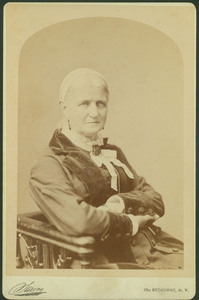
Eunice Bullard Beecher Photograph
Eunice Bullard Beecher
Gender:
Female
Born:
1812
Died:
1897
Home Town:
West Sutton, MA
Later Residences:
Lawrenceburg, IN
Indianapolis, IN
Brooklyn, NY
Indianapolis, IN
Brooklyn, NY
Marriage(s):
Henry Ward Beecher (1837)
Biographical Notes:
In 1812, Eunice Bullard White was born in West Sutton, Massachusetts. She married Henry Ward Beecher in 1837, and moved to Indiana with her husband immediately after her marriage. Henry Beecher was later to become a well-known Presbyterian minister, and for the first ten years of his career he would serve two churches in Indiana. The first church he served was the First Presbyterian Church in Lawrenceburg, Indiana, on the banks of the Ohio River. Indiana had become a state just two decades earlier, and it still had the rawness of a newly settled territory. While Eunice Beecher enjoyed the comforts of her life back East, she was excited and more than willing to embark with her new husband to this unfamiliar territory in order to support him in his ministry.
This enthusiasm and eagerness ...
[more]
This enthusiasm and eagerness ...
[more]
Immediate Family (Why only immediate family?)
- Henry Ward Beecher
Husband
LFA (1824)
Contact Us
Do you have more information for the Ledger?
If you have family papers, objects, or any other details you would like to share, or if you would like to obtain a copy of an image for publication, please contact us at curator@litchfieldhistoricalsociety.org.